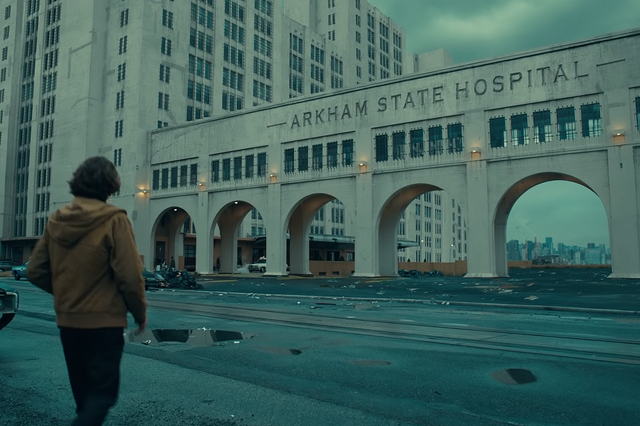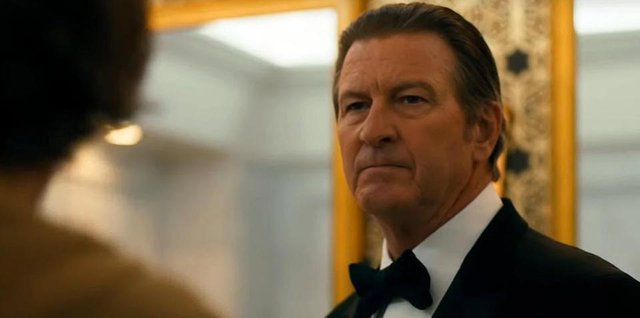Joker: Thoughts on Mental Illness And Society
This blog post contains my thoughts on the new Joker movie, and as such will contain a fair few spoilers and a lot of discussion of the plot. You have been warned.

Joaquin Phoenix as The Joker. Picture credit: Warner Brothers
It has been a while since I have seen a movie that put as many thoughts in my head as Joker, the newest movie in the DC Comics universe. Sure, both Blade Runner 2049 and to a lesser extent Ghost In The Shell gave me new fodder for my ongoing thoughts on the topics of transhumanism and what is means to blur the line between man and machine (a blog post for another time) and Star Wars: The Last Jedi made me think up novel and exotic phrases to derisively describe what as I saw as the absolute butchering of the franchise I once loved, but none of these thoughts were new (in case of the former two movies mentioned) or very constructive (in the case of the latter).
No, Joker touched a nerve with me because it tells the story of a man struggling with and finally succumbing to madness and violence in an increasingly brutal world dominated by smoldering class warfare and the dismissal and ridicule of mental illness. Topics that means a lot to me personally and that, I like to believe, are and will always be relevant in any society. So here is my personal (libertarian) thoughts on the movie.
Going Joker: Mental Illness In Our Society
One of the most striking things about Joker is Joaquin Phoenix’ outstanding performance as the mentally ill and socially awkward protagonist Arthur Fleck, who suffers from, among other things, a grating involuntary laughter. Fleck ekes out an existence at the bottom rungs of Gotham City society working as a party clown, where he suffers from constant negative thoughts, almost daily humiliation due to his condition and even physical assault. Over the course of the movie, the indifference and neglect he suffers due to his mental illness combined with seeing his attempts at stand-up being mocked by his hero and stand-in father figure, the talk show host Murray Franklin, act as catalysts for driving him over the edge and taking on the violent and nihilistic Joker persona.

Arthur Fleck at the Arkham State Hospital, home for the mentally ill. Picture Credit: Warner Brothers
The care for and fate of the mentally ill is a topic that should concern anyone regardless of their political observation, but I find this question another point of critique directed towards libertarians and libertarian societies in general. A pretty straight-forward rebuttal, however, would be that the big government welfare states have yet to demonstrate that they are capable of dealing with the issue themselves. Being a lifelong resident of one of the world’s biggest and presumably most successful welfare states, I am dismayed to see that there is still a significant issue with the mentally ill being lost in a system that in many ways seem like it exists for its own sake and not for the sake of the weakest members of society that it was put into place to help and protect. The failure of big government to handle the issue was also displayed brilliantly in Joker, where Arthur is depicted meeting an apathetic psychologist on a regular basis, who pays little attention to what he actually tells her and after a session tells him that spending had been cut for his program and that: “The system does not give a shit about people like you”
So what should be done? You often hear libertarians argue that as long as all property is privately owned, there would not be the ‘tragedy of the commons’ type of situation, where the homeless and mentally ill gather on public squares and cannot be easily removed, but surely the mentally ill would have to go somewhere? As a personal analogy, I was invited to a friend’s housewarming this weekend and the journey there required a longish train ride from my home to his. When I entered the train carriage, I immediately noticed another passenger looking like your stereotypical mentally ill homeless man mumbling to himself and occasionally screaming profanities and threats at nearby passengers in a gravelly voice and even at one point started smoking in the carriage despite it being clearly signposted that the entire train was non-smoking. While his threats were pretty graphic, nobody paid any attention to him other than the occasional crooked smile and expressions of mild annoyance or simply responded to his outbursts by moving to another carriage. Train staff even came by and interacted with him a few times, but no attempt was made to remove him from the train despite his blatant violations of basically any rule there is. While I am sure that most passengers, myself included, would have loved to have seen him being thrown off the train at the first opportunity, as it would have solved our problem of not having to be involuntarily subjected to cigarette smoke and the ramblings of a crazy person. However, he would be no better off stuck on an unknown station in his own personal hell that is his mental illness. He would be no better off, and at best we as passengers would just have pushed the problem on to the passengers of the next train that stops at that station. Despite his incoherent threats, this particular man seemed pretty harmless, but what about a man like Arthur Fleck, who is likewise troubled by mental illness but lucid enough to lash out in frustration when his mental illness goes neglected for too long and his suffering becomes unbearable?
Kill The Rich: When Do Role Models Turn Into Enemies?
An underlying narrative in Joker is the increasing social tension building in Gotham City as the disenfranchised poor of the city due to rampant unemployment are feeling an increasing alienation from the higher classes of the society, which eventually erupts into riots and anarchy under the parole ’Kill the rich’. I found the course with which Gotham society descended into anarchy an interesting one, especially its inception with the interview of Thomas Wayne in the wake of the three murders of the three Wayne Enterprise employees in the subway, where Wayne condemns the murders, and calls Gotham's growing numbers of disenfranchised and impoverished inhabitants clowns and claims that they need his help as mayor to escape their fate.

Thomas Wayne. Picture credit: Warner Brothers
As a libertarian, I found this noteworthy, because it is one of the best examples of what you could describe as the Libertarian Moral Pitfall that has ever been put to film. The moral principles of libertarianism rests on the premise of private property rights and self-ownership as well as the implicit assumption that everybody can carve out an existence for themselves through hard work and perseverance. I find that there is a lot of truth to this assumption, and it is backed by the fact that personal qualities such as hard work, conscientiousness and perseverance are almost universally seen as good, at least to an extent. The pitfall happens, when you successfully apply this formula to yourself and then, often condescendingly, tell other less fortunate people to just buck up and work harder without knowing their personal background or the course of events that has led them to their current situation. It is like when you hear wildly successful entrepreneurs such as Joe Rogan or Stephan Molyneux tell their audiences about how they should just quit their 9-to-5 jobs and throw themselves into starting a business without recognizing that such a move requires a very specific temperament and a lot of sacrifice and comes with significant monetary risk, which not everyone are at liberty to take and that for every one Joe Rogan and Stephan Molyneux, there are 1000 entrepreneurs who tried, failed and lost everything. Even if the claim that you will achieve more if you persistently work hard than if you do not is true (which I hope any sane person will argue that it is), pushing this point too much runs the risk of coming off as unsympathetic and tone-deaf, which can illicit a very negative emotional response from the recipient(s), and sometimes disastrously so, such as in Thomas Wayne's case. While the moral pitfall is often a point of critique leveled at libertarians, and one I think that any somewhat successful person no matter their political leanings have at one point been guilty of falling into, I think it is important to discuss the other side of the coin to this: If the extreme self-help approach of the pitfall is one end of a continuous scale, letting a person, sometimes involuntarily, become completely dependent on you for their livelihood is the other. Examples of this other extreme can be found among so-called helicopter parents, who rather than using their tenure as parents to teach their children to be a functioning adult, do it to run their lives even as adults and constantly hover over them (hence the term) or the person, who is so desperate for positive attention from their friend and/or partner that they are willing to do things, which by normal people would be considered unreasonable, such as continually lending the other person money or act as emotional support without the gesture ever being reciprocated. I think most people would agree that the examples I described above are unhealthy if not abusive, and I have on a societal level personally experienced the shortcomings and the creeping soft totalitarianism of a social system that tries to take care of an ever increasing portion of its citizens’ lives and in the process slowly ends up infantilizing them.
Summing Up
In the political metadiscussion about what constitutes the ideal society, I find the two conundrums discussed above to be of paramount importance: What is the best way to create functioning safety nets for those who are struggling with mental illness to the point where they cannot take care of themselves and could pose a danger to themselves and others and how to instill a culture that encourages industry and hard work to the extent where it teaches people how to set and reach their own goals in life but not to an extent where it alienates the less fortunate so much that they end up burning the city and lynching the rich. As for my answers, I am afraid I do not have any concrete ones; these are extremely complicated and to an extent interlocking problems that includes many variables, both cultural and economic. I come to these problems as a libertarian, because I have experienced how giant public monopolies and disabling market forces have created an impersonal system that provides average to mediocre services to those persistent enough to make sure the system makes good on its promises and steamrolls those too weak, too infirm or to mentally ill to fight the system, but what the optimal alternative would look like in practice, I cannot say for certain. As for how to avoid alienation between the top and the bottom of a given society, I can only suggest that we should not be afraid to hold our fellow man to a standard, but also always try to show kindness and understanding. This is easier said than done, I know, but it is an enticing thought that if Arthur had just had one person in his life, who had shown him genuine kindness, he would not have been driven to those extremes. I think the the God Entity from the Futurama episode Godfellas said it best:
When you do things right, people won't be sure you've done anything at all. (…) If you do too much, people get dependent on you.
Joker is a movie that feels both timeless and extremely relevant in the current year. While the ire of the people on the bottom of Gotham's society is directed towards the rich symbolized by the billionaire Thomas Wayne, father of the future Batman, it does not take much cognitive effort to make a comparison to the riot scenes at the end of the movie to the very real riots that takes place on an almost daily basis in Hong Kong right now, and while the protests in Hong Kong are directed towards an increasingly oppressive government one could make an argument that the rich and the people in power are if not the same then at least groups with a significant overlap, and the marginalized and brutalized protagonist succumbing to and embracing violence in the end is an eerily familiar story in this day and age where mass shootings are becoming a not so rare phenomenon. That said, I have little patience with those who claim that the movie is somehow glorifying incel violence. While the Joker taking revenge on his bullies can seem justified, His actions are clearly disproportionate and deranged and while it adds a welcome nuance to a character that has often been depicted as nothing but an purely evil madman, does nothing to change the fact that the Joker is a villain and not a hero in the DC universe.
Thank you for reading! If you like my content, please leave an upvote and a comment and please consider following me as well!
Hello @cogitecture, thank you for sharing this creative work! We just stopped by to say that you've been upvoted by the @creativecrypto magazine. The Creative Crypto is all about art on the blockchain and learning from creatives like you. Looking forward to crossing paths again soon. Steem on!
Thanks guys!
To listen to the audio version of this article click on the play image.

Brought to you by @tts. If you find it useful please consider upvoting this reply.
This post was shared in the Curation Collective Discord community for curators, and upvoted and resteemed by the @c-squared community account after manual review.
@c-squared runs a community witness. Please consider using one of your witness votes on us here
Hello!
This post has been manually curated, resteemed
and gifted with some virtually delicious cake
from the @helpiecake curation team!
Much love to you from all of us at @helpie!
Keep up the great work!
Manually curated by @veryspider.
@helpie is a Community Witness.
Thank you @helpiecake and @veryspider ^_^
Resteem it
Thanks a lot!
good post!!
I love this movie <3
Thanks a lot, @annamarina! It is a brutal, yet amazing movie for sure :)
That's a very powerful post, @cogitecture... Well done!
I just wrote something that is 100% connected with our post (including this movie). If you - or anyone else reading this comment - would like to read it, here's the link: https://steemit.com/movies/@wiseagent/society-is-going-crazy-and-movies-can-t-be-blamed-for-it.
Thanks for your comment, @wiseagent! I'll check it out for sure :)
Congratulations @cogitecture! You have completed the following achievement on the Steem blockchain and have been rewarded with new badge(s) :
You can view your badges on your Steem Board and compare to others on the Steem Ranking
If you no longer want to receive notifications, reply to this comment with the word
STOPVote for @Steemitboard as a witness to get one more award and increased upvotes!